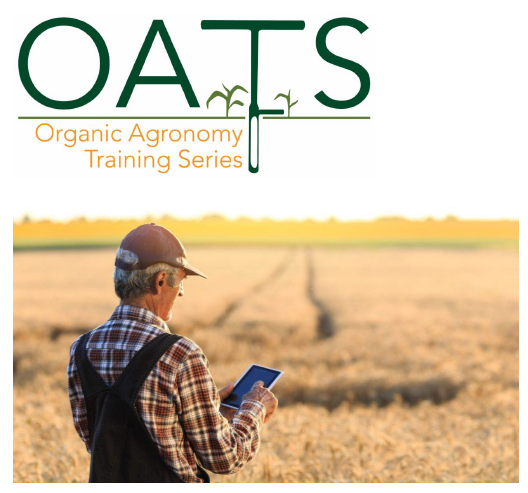As demand for organic grain products soars, newly certified organic grain farmers — or those in the process of transitioning to organic grain — struggle to find reliable technical service and support as they navigate this new production system.
Upcoming two-day pilot sessions of the Organic Agronomy Training Series (OATS) can help agronomists, crop advisors, extension agents and technical service providers receive education on organic production systems and USDA-National Organic Program regulatory compliance — and more strongly support these farmers.
Co-hosted by Purdue Extension, the OATS East pilot session will be held July 24-25 at Fusion 54, 119 N. Green St., in Crawfordsville, Ind. Early-bird registration for the training is available through Sunday, June 16. The registration deadline is midnight on Sunday, July 14.
Agronomists, certified crop advisors / consultants, extension agents and technical service providers in Indiana, Ohio, Michigan and Illinois are encouraged to attend. (An additional session for the same audiences in Wisconsin, Minnesota and Iowa will be held in August.) OATS East participants will visit a nearby organic farm that features a grain and livestock operation with parallel conventional and certified-organic row crop production.
According to the Organic Trade Association, sales of U.S. organic products have grown from $3.6 billion in 1997 to nearly $50 billion in 2017. While organic food sales make up 5.5% of total U.S. food sales, less than 1% of U.S. farmland is dedicated to organic production (with much of the shortfall made up by imports).
Organic grain production is as much an opportunity for advisors and consultants eager to grow their customer bases and support diverse production with potential for increased margins as it is for farmers interested in diversifying cropping systems and income streams. However, a recent report from the U.S. Organic Grain Collaboration identified a shortage of technical service providers that understand organic production and offer sufficient support. Founded in 2018, OATS unites industry, nonprofit, agency and agronomy partners to fill the gap.
“If OATS is a success, it will increase the number and geographic spread of technical service providers able to meet the needs of organic grain producers,” says Michael O’Donnell, organic and diversified agriculture educator for Purdue Extension. “In turn, that will help grow available organic acreage, optimize organic production systems and maximize the potential for success among existing and transitioning growers.”
After completing the OATS training, participants will be able to:
- Provide basic agronomic services to certified / transitioning organic producers
- Discuss successful organic crop production strategies
- Understand thoroughly the organic certification and inspection process
- Advise producers on compliance with all applicable USDA rules and regulations
- Recommend profitable, diverse crop rotations that meet rotational requirements
- Understand organic weed-control strategies, including cultural and mechanical
- Advise on the integration of cover crops and reduced tillage into organic systems
- Recommend organically approved pest-control strategies
- Advise on basic organic fertility programs
- Refer to current research relevant to organic production systems
“Those who complete the OATS pilot program can become more confident, knowledgeable resources for producers in this growing segment of U.S. agriculture,” O’Donnell says.
Continuing Education Units for Certified Crop Advisors have been requested for this training.
For more details on the pilot training, or to register, visit thelandconnection.org/OATS or organicagronomy.com.
Sponsorship opportunities are also available at thelandconnection.org/sponsorOATS.
Writer: Nick Rogers, 765-494-0948, rogersn@purdue.edu
Sources: Michael O’Donnell, 765-284-8414, modonnel@purdue.edu
and Mallory Krieger, 217-840-2128, mallory@thelandconnection.org



